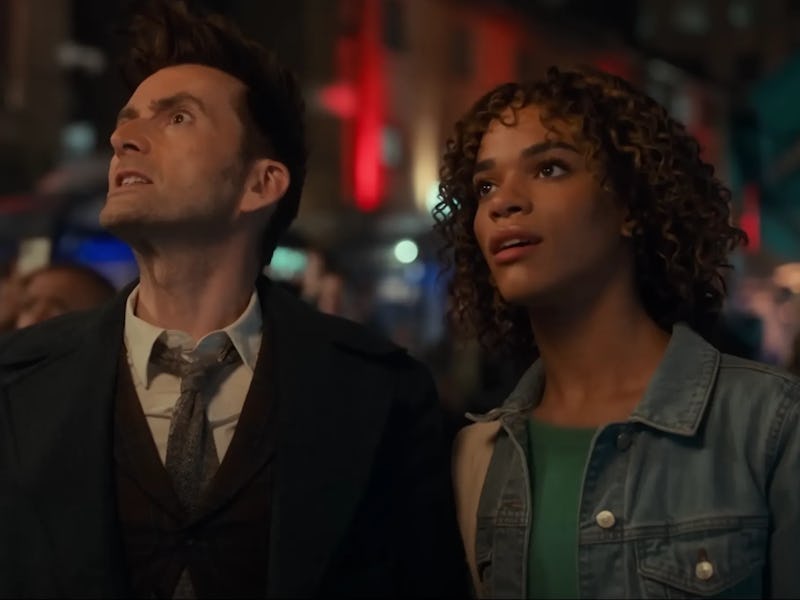Doctor Who Just Took a Powerful Stance on an Important Topic
On its 60th anniversary, this British institution made up for lost time and addressed an obvious influence.

With long-running TV shows, there’s always a moment when it has to be acknowledged that the world we live in has evolved faster than the world within fiction. Apu in The Simpsons has been recast, Mac from It’s Always Sunny in Philadelphia has come out as gay instead of just being the punchline to gay jokes, and even Jeff Probst’s Survivor catchphrase of “come on in, guys” has been shortened to not be deemed sexist.
While Doctor Who, the longest-running sci-fi show ever, has made some strides towards inclusion, in a lot of ways it’s lagged behind. That’s somewhat understandable: it’s a family show and a cultural mainstay; any changes are bound to start a discussion. But in the first 60th anniversary special, “The Star Beast,” returning showrunner Russell T. Davies took extra care to catch the show up with current times — and created a great (if occasionally pandering) model of transgender representation in media.
Spoilers for Doctor Who’s “The Star Beast” follow!
Ahead of the specials, Doctor Who fans were thrilled with a slew of great updates. Russell T. Davies, who brought the show back in 2005 and oversaw its first four seasons, would return as showrunner. David Tennant, who played the fan-favorite 10th Doctor, would also play the newly-regenerated 14th Doctor and would be reunited with his old friend Donna Noble (Catherine Tate). But the most exciting turn of events was the new addition to the Doctor Who family: Yasmin Finney, a trans actress, who was cast as Donna’s daughter Rose.
Yasmin Finney as Rose Noble in “The Star Beast.”
Davies is no stranger to queer representation in television. In his previous work on the shows Cucumber, Banana, and Queer as Folk, he included all kinds of characters across the queer spectrum. But now, his perspective has changed.
"If you look at something I wrote in 1999, with Queer as Folk, where I had almost an entirely white cast. That's simply inconceivable now,” he told Digital Spy. "That's naturally changed, led very much by our casting director Andy Pryor, who's a power in the land. It's a more open door, still opening it further and further and further, as much as we can.”
But casting can only go so far: Finney isn’t even the first openly trans person cast in Doctor Who, with trans woman Bethany Black playing a supporting role in the episode “Sleep No More.” The issue is her character’s transness was never acknowledged, which is great for normalizing but doesn’t celebrate how transness can add to the Doctor Who world. Even the Doctor technically is trans: they’ve had 13 different faces and have been both male and female presenting.
Rose’s trans identity turns out to be evidence of the Doctor’s subconscious influence on her life.
In “The Star Beast,” Rose’s transness is not only celebrated — it saves her mother’s life. Since Donna had previously absorbed the Doctor’s energy, he erased her memory so the sheer force wouldn’t overwhelm her. But because Donna had Rose, she ended up splitting the force between the two of them. The evidence is all right there: like The Doctor, Rose has presented as both male and female, chose her own name, and hides out in a box (her shed, not the TARDIS.)
But just because her identity helps save the day, that doesn’t mean every scene is praising her for transitioning. In an early scene, we see a pack of bullies call her by her deadname (her birth name), and in another scene, Donna’s mother slips up and refers to Rose by a “he” pronoun, remarking how she can be clumsy sometimes. It’s not fun to watch, but it’s an accurate portrayal of what transition looks like. You don’t just change your name and pronoun, and suddenly it’s better.
Not every moment of inclusion is seamless — the moment when Rose chides the Doctor for assuming an alien’s pronouns feels a little too on-the-nose — but after 60 years of nothing but cisgender characters, there’s bound to be a little overcorrection.
As Doctor Who casting director Andy Pryor told Doctor Who Magazine, “If you can’t cast diversely on Doctor Who, what show can you do it on?” “The Star Beast” just proves that casting can go beyond just tokenization — it can accurately portray the struggles different kinds of people face while still keeping them important to the story.